COFFEE. CULTURE. CRAFT. FLAVOR

Discover the Rich Heritage & Unique Flavor of Indian Coffee
India’s relationship with coffee dates back to the 17th century, when the legendary Baba Budan smuggled seven raw beans from Yemen and planted them in the hills of Chikmagalur, Karnataka. From those seven seeds grew a thriving tradition. Over the centuries, Indian coffee has evolved from a small-scale cultivation into a globally recognized origin known for shade-grown, hand-picked, and meticulously processed coffee. At Tropical Trading Co, we are proud to share India’s finest coffees with the world — a cup steeped in history, biodiversity, and flavor.
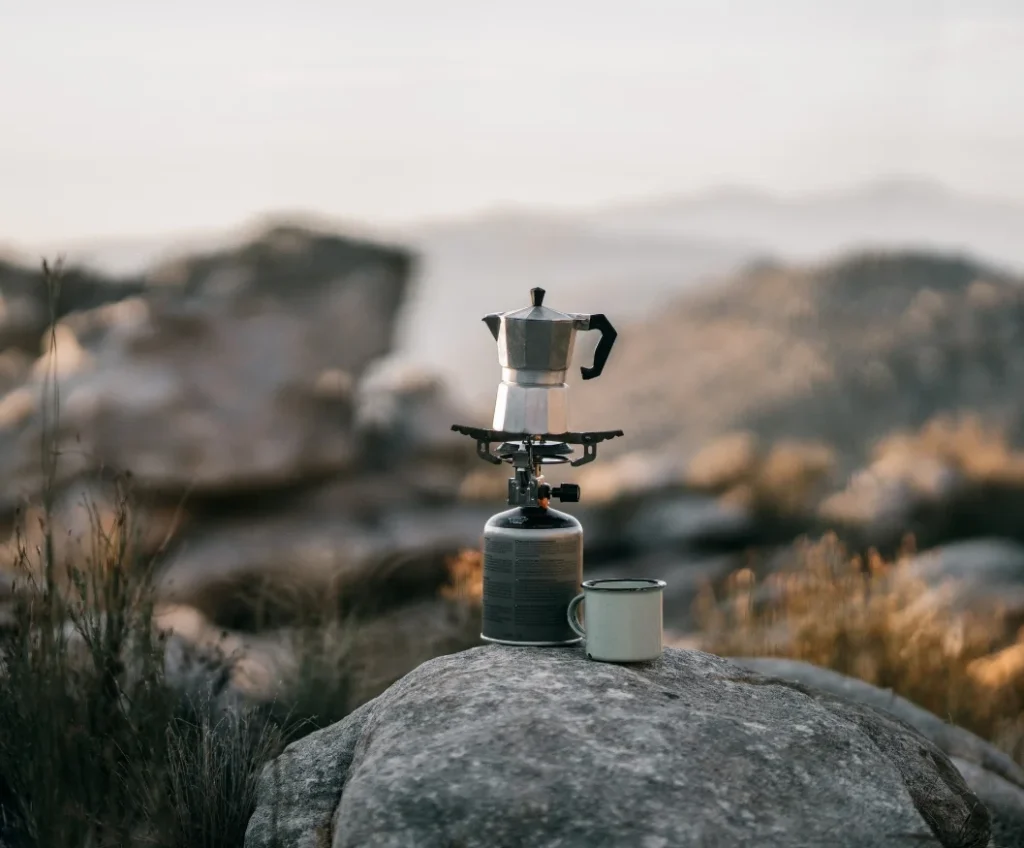
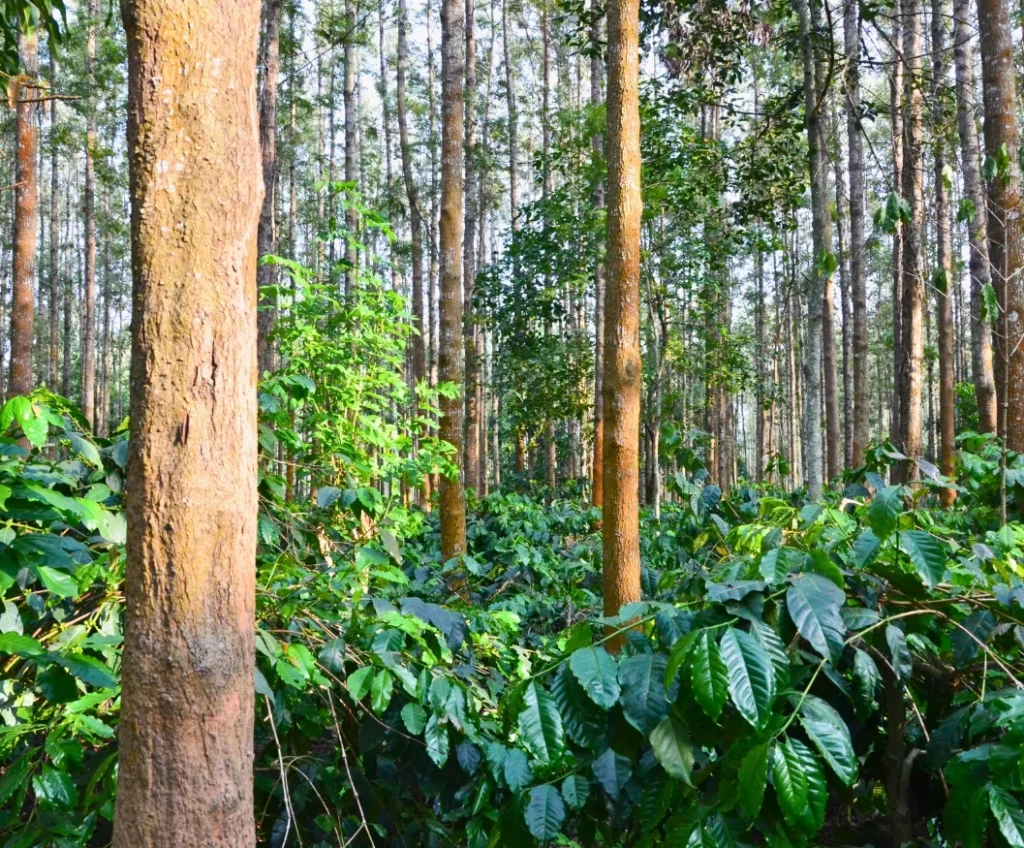
Flavored by Forest. Picked by Hand.
Unlike most major coffee regions, India’s coffee thrives under the canopy of ancient trees; intercropped with spices like cardamom, pepper, and citrus. This environment infuses every bean with complex, earthy, and aromatic flavors. Grown on steep, sloped estates where machines can’t reach, our coffee is always hand-picked; ensuring that only the ripest cherries make it to the cup.
GI-Tagged & Specialty Coffees of India
Indian coffee’s uniqueness is legally protected by Geographical Indications (GI). Coffees like Coorg Arabica, Bababudangiri Arabica, Chikmagalur Arabica, and Wayanad Robusta hold GI tags; a mark of authenticity, traceability, and terroir.
India is also home to an emerging specialty coffee movement, with growers innovating in fermentation, processing, and sustainable practices. We source from farms pushing the boundaries to offer micro-lots, single-origin, and limited-edition beans that meet the standards of discerning global roasters.
A Diverse Landscape of Coffee Varieties
India produces both Arabica and Robusta coffee — each with unique flavor profiles shaped by their microclimates. From bold, full-bodied Robusta beans grown at lower elevations to the delicate, floral Arabica beans cultivated on high-altitude estates, Indian coffee offers a versatile flavor spectrum for every palate.
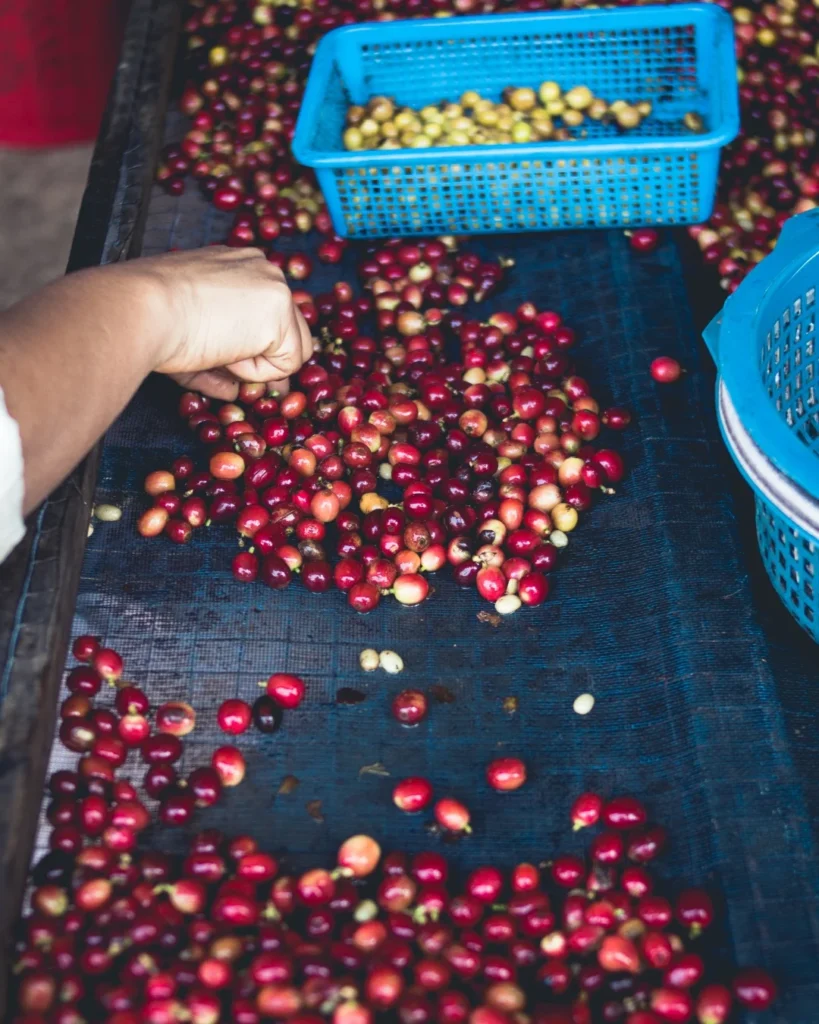
Eco-Conscious Processing Methods
India offers all major processing methods
- Washed (wet)
- Natural (dry)
- Honey-processed
We’re especially excited about the honey process; a hybrid method that retains the mucilage of the coffee cherry, enhancing sweetness and body while reducing water usage by up to 50% compared to traditional washed methods. It’s a sustainable and flavor-rich alternative that’s gaining traction with specialty roasters worldwide.
What Makes Indian Coffee Stand Out?
Unlike most major coffee-growing regions, Indian coffee is shade-grown under a forest canopy, intercropped with spices, fruits, and other native flora. This biodiversity imparts a distinctive, nuanced flavor to the beans and promotes ecological harmony. Insects, birds, and animals co-exist with coffee — creating a truly sustainable, organic ecosystem.
Moreover, the terrain of Indian coffee farms — often located on sloped, high-altitude estates — makes mechanized harvesting impractical. That’s why Indian coffee is still hand-picked, ensuring only ripe cherries are selected, improving quality and consistency in the cup.
Traditional Roots. Bold Methods.
From washed and natural to the uniquely Indian monsooned method, our producers work with time-honored techniques passed down through generations. Each process shapes the flavor in distinct ways; deepening body, balancing acidity, or softening edges with age.
Innovation, too, has found its place. Honey processing, a sustainable hybrid, retains part of the coffee cherry for added sweetness and depth — while using up to 50% less water. It’s a future-forward method India is embracing, blending tradition with conscious craft.
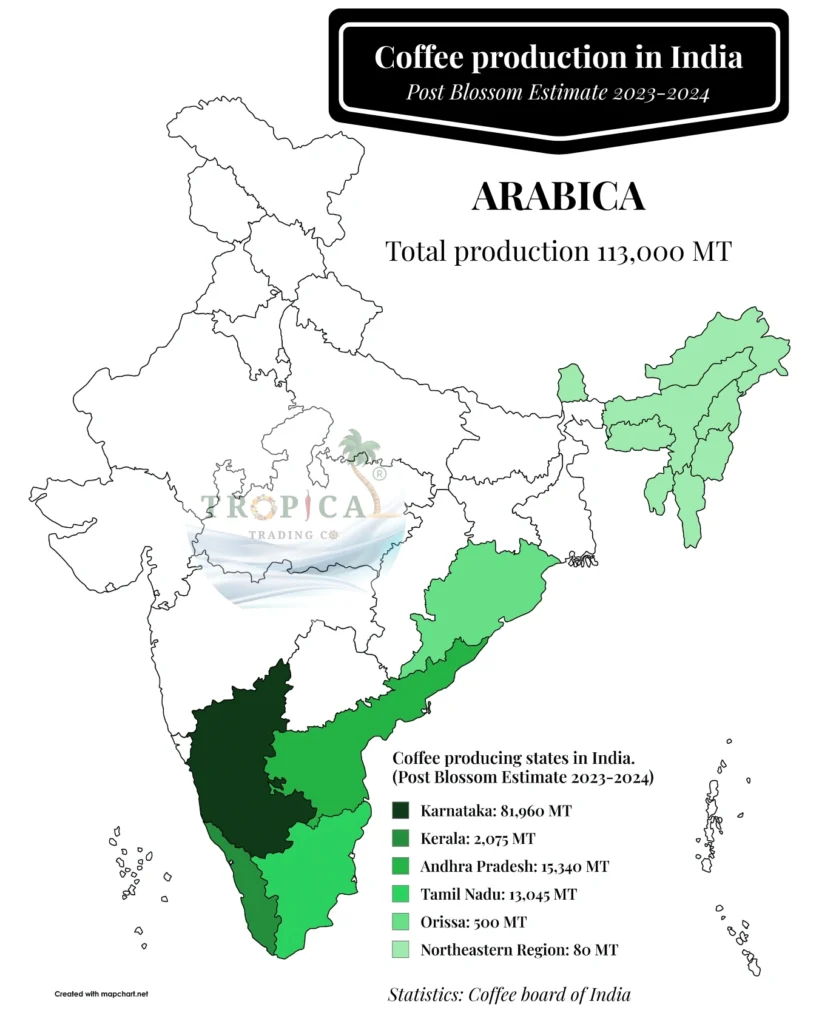
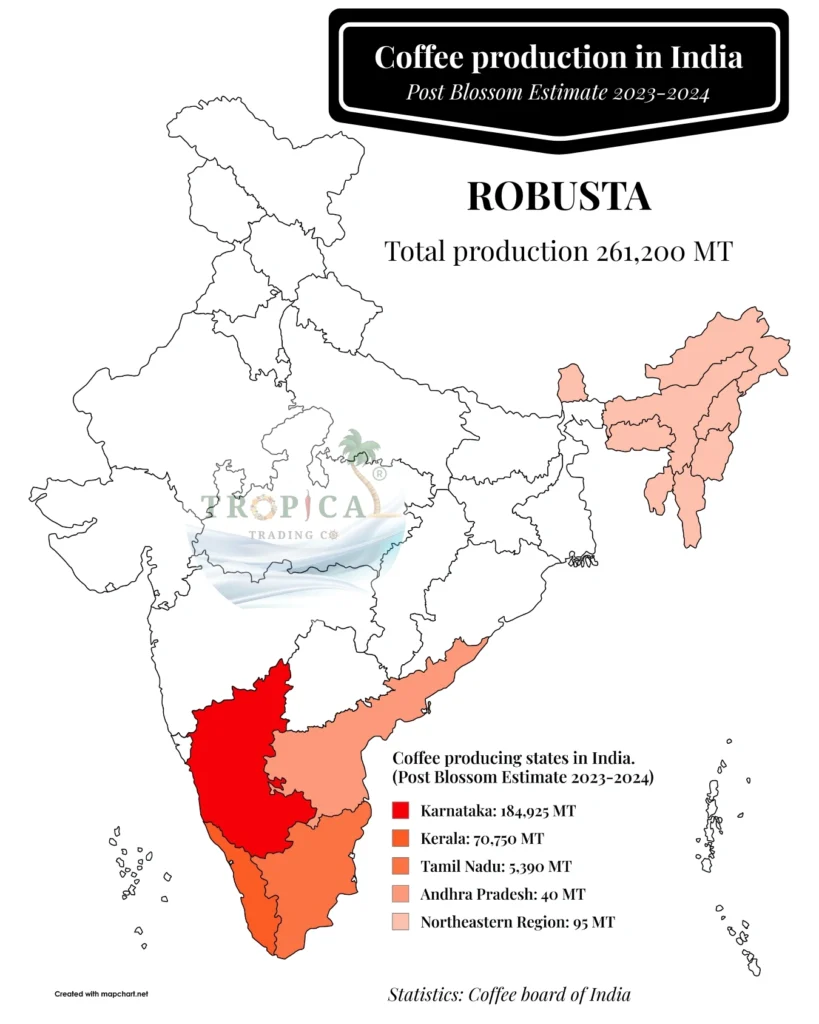
In the 2023–24 coffee year, India’s total production reached 374,200 metric tons (113,000 t Arabica + 261,200 t Robusta) according to the Coffee Board of India’s post-blossom estimates. Globally, this places India as the world’s seventh-largest coffee producer, contributing about 3–4 % of total global output. India is also noted as the fifth-largest Robusta producer worldwide iasgyan.in.
Unlike many major coffee-producing countries, India’s coffee cultivation is deeply rooted in shade-grown agroforestry systems within the Western and Eastern Ghats. This traditional approach preserves forest canopies, supports biodiversity, and crucially prevents deforestation, contrasting sharply with large-scale mono-cropping elsewhere. Over 98 % of India’s coffee growers are smallholders who maintain coffee plants under existing forests; safeguarding the environment while producing high-quality beans.
This fusion of robust production, global standing, and sustainable, forest-friendly practices positions India as a model for marrying productivity with environmental stewardship in the global coffee landscape.
Chikmanglur, Karnataka
India’s coffee cradle, where high-altitude Arabica thrives under dense shade and heritage farming traditions.
Elevation (m):
900–1,400
Rainfall (mm/year):
1,500–2,000
Avg Temp Range (°C):
15–25
Climate Description:
Cool, moist Western Ghats; distinct bloom & backing rains
Soil Type:
Rich loamy, red/lateritic, slightly acidic
Varieties:
Shade-grown Arabica; birthplace of Indian coffee; intercropped with spices
Coorg (Kodagu), Karnataka
The country’s largest producer, known for its bold Robusta intercropped with pepper and cardamom in rainforest estates.
Elevation (m):
800–1,100
Rainfall (mm/year):
2,500–3,500
Avg Temp Range (°C):
15–25
Climate Description:
Rainy, cool, high humidity
Soil Type:
Red lateritic, organic-rich
Varieties:
Robusta & Arabica; intercropped with pepper, cardamom
Wayanad, Kerala
Robusta heartland rooted in tribal wisdom and biodiversity, producing earthy, full-bodied beans.
Elevation (m):
700–900
Rainfall (mm/year):
2,000–3,000
Avg Temp Range (°C):
20–28
Climate Description:
Tropical monsoon, high humidity
Soil Type:
Loamy, slightly acidic; good drainage
Varieties:
Robust forests, tribal farms; Robusta focus
Shevaroy Hills, Tamil Nadu
High-elevation terroir yielding complex, fruity Arabicas with refined acidity and floral notes.
Elevation (m):
1,200–1,500
Rainfall (mm/year):
1,000–1,800
Avg Temp Range (°C):
15–25
Climate Description:
Cooler hill climate, fruity/complex notes
Soil Type:
Rich loamy lateritic
Varieties:
Fruits of high‑altitude; Arabica farming
Araku Valley, Andhra Pradesh
A rising star in specialty Arabica, grown organically by tribal collectives amidst the Eastern Ghats.
Elevation (m):
900–1,100
Rainfall (mm/year):
1,200–1,800
Avg Temp Range (°C):
15–25
Climate Description:
Eastern Ghats, organic tribal farms
Soil Type:
Upland loamy, acidic
Varieties:
Organic Arabica, specialty recognitions
Assam / Northeast India
India’s newest frontier for forest-grown coffee, offering wild, aromatic beans from untouched highlands.
Elevation (m):
800–1,200+
Rainfall (mm/year):
1,500–2,500+
Avg Temp Range (°C):
15–30 (subtropical)
Climate Description:
High monsoon rainfall, humid, subtropical to highland hill climates
Soil Type:
Red lateritic to hill forest soils; acidic, organic carbon rich
Varieties:
Robusta & emerging Arabica; forest‑grown tribal farms
What We Offer
At Tropical Trading Co, we supply and ship:
Green coffee beans (Arabica & Robusta)
Roasted whole beans and ground coffee
High-quality instant coffee (spray-dried and agglomerated)
Whether you’re a large-scale importer or a boutique roastery, we tailor our offerings to suit your scale and taste.
Flexible Trade Terms and Packaging
We work with:
-
Importers preferring FOB, CIF, or CFR terms
-
Roasteries and small-batch buyers who need DDP delivery straight to their door
Our flexible MOQs, customized packaging solutions, and reliable logistics support make us the ideal sourcing partner for Indian coffee. From jute bags with GrainPro liners to vacuum-sealed pouches; we adapt to your needs.



Let’s Brew a Partnership
We are passionate about coffee; not just as a product, but as a living heritage, a sensory journey, and a bridge between cultures. Whether you’re looking for traceable specialty lots or commercial volumes, we’re here to deliver excellence in every bean.
Contact us today to discuss your sourcing needs or request samples. Let us help you discover the true taste of India; one cup at a time.




Exploring India’s Coffee Wonderland
When it comes to coffee production, India may not be the first country that comes to mind, but it has a hidden gem in the southern state of Karnataka. Nestled amidst the lush Western Ghats, Karnataka boasts a thriving coffee culture, producing some of the finest coffee beans in the world. In this article, we’ll delve into the statistical data, the history of coffee in Karnataka, and why this state enjoys the perfect climate and weather for coffee cultivation.
